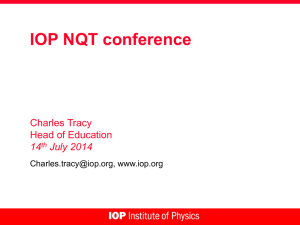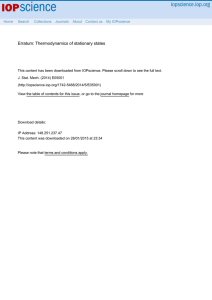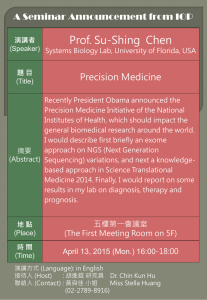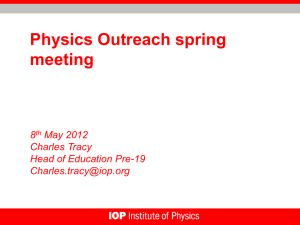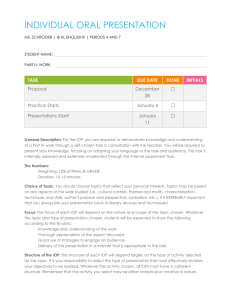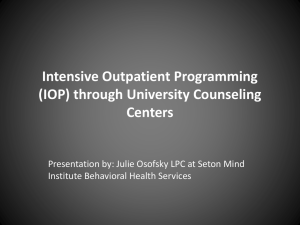IoP Research Strategy - King`s College London
advertisement
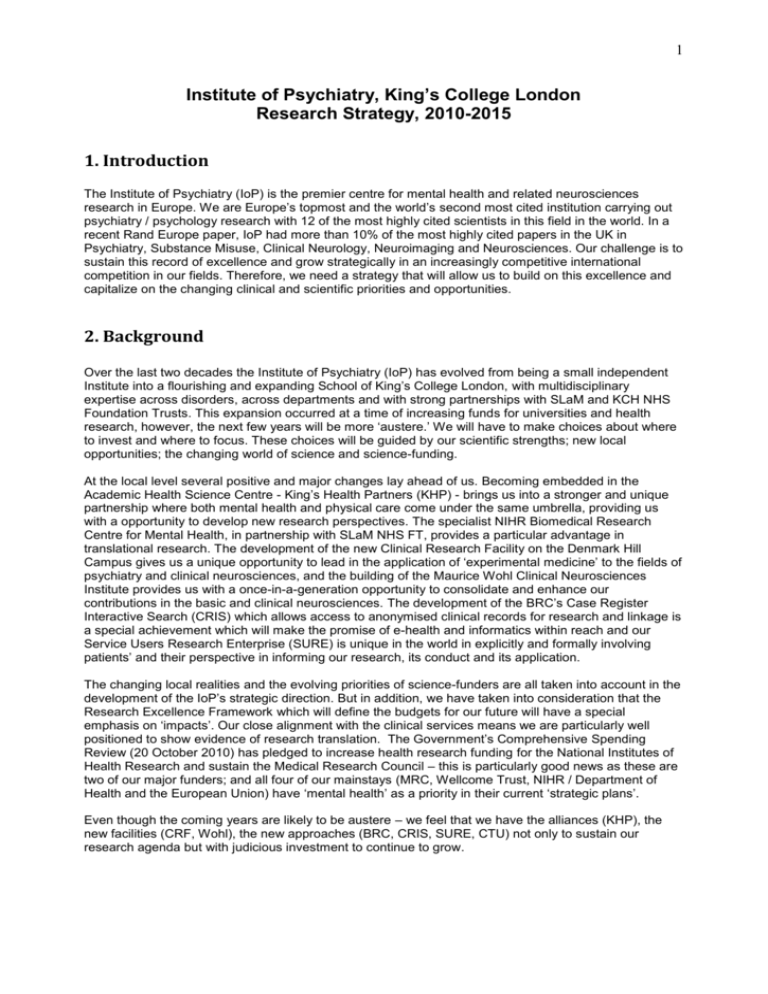
1 Institute of Psychiatry, King’s College London Research Strategy, 2010-2015 1. Introduction The Institute of Psychiatry (IoP) is the premier centre for mental health and related neurosciences research in Europe. We are Europe’s topmost and the world’s second most cited institution carrying out psychiatry / psychology research with 12 of the most highly cited scientists in this field in the world. In a recent Rand Europe paper, IoP had more than 10% of the most highly cited papers in the UK in Psychiatry, Substance Misuse, Clinical Neurology, Neuroimaging and Neurosciences. Our challenge is to sustain this record of excellence and grow strategically in an increasingly competitive international competition in our fields. Therefore, we need a strategy that will allow us to build on this excellence and capitalize on the changing clinical and scientific priorities and opportunities. 2. Background Over the last two decades the Institute of Psychiatry (IoP) has evolved from being a small independent Institute into a flourishing and expanding School of King’s College London, with multidisciplinary expertise across disorders, across departments and with strong partnerships with SLaM and KCH NHS Foundation Trusts. This expansion occurred at a time of increasing funds for universities and health research, however, the next few years will be more ‘austere.’ We will have to make choices about where to invest and where to focus. These choices will be guided by our scientific strengths; new local opportunities; the changing world of science and science-funding. At the local level several positive and major changes lay ahead of us. Becoming embedded in the Academic Health Science Centre - King’s Health Partners (KHP) - brings us into a stronger and unique partnership where both mental health and physical care come under the same umbrella, providing us with a opportunity to develop new research perspectives. The specialist NIHR Biomedical Research Centre for Mental Health, in partnership with SLaM NHS FT, provides a particular advantage in translational research. The development of the new Clinical Research Facility on the Denmark Hill Campus gives us a unique opportunity to lead in the application of ‘experimental medicine’ to the fields of psychiatry and clinical neurosciences, and the building of the Maurice Wohl Clinical Neurosciences Institute provides us with a once-in-a-generation opportunity to consolidate and enhance our contributions in the basic and clinical neurosciences. The development of the BRC’s Case Register Interactive Search (CRIS) which allows access to anonymised clinical records for research and linkage is a special achievement which will make the promise of e-health and informatics within reach and our Service Users Research Enterprise (SURE) is unique in the world in explicitly and formally involving patients’ and their perspective in informing our research, its conduct and its application. The changing local realities and the evolving priorities of science-funders are all taken into account in the development of the IoP’s strategic direction. But in addition, we have taken into consideration that the Research Excellence Framework which will define the budgets for our future will have a special emphasis on ‘impacts’. Our close alignment with the clinical services means we are particularly well positioned to show evidence of research translation. The Government’s Comprehensive Spending Review (20 October 2010) has pledged to increase health research funding for the National Institutes of Health Research and sustain the Medical Research Council – this is particularly good news as these are two of our major funders; and all four of our mainstays (MRC, Wellcome Trust, NIHR / Department of Health and the European Union) have ‘mental health’ as a priority in their current ‘strategic plans’. Even though the coming years are likely to be austere – we feel that we have the alliances (KHP), the new facilities (CRF, Wohl), the new approaches (BRC, CRIS, SURE, CTU) not only to sustain our research agenda but with judicious investment to continue to grow. 2 3. Development and Elements of the IoP Research Strategy Informed by these developments, this Research Strategy is the product of a multi-step consultation process. First, the entire academic staff were consulted via an all staff survey during August / September 2010. This gave the broad outlines of our strengths, opportunities and challenges. These informed an Away Day in October 2010 attended by the Dean, Vice Deans, Heads of Department, Research Committee and representation from earlier stage career staff and from partner organisations – where the specific opportunities were considered in more detail. This was followed by further refinement of the proposals in discussion with Heads of Department and other key stakeholders. In particular, the strategy takes into account that KHP has prioritised research along four “grand challenges”: the development of new therapeutics including drugs, personalised medicine, bioinformatics and primary care, health and prevention. It was informed by the fact that the KHP has made the overlap between physical and mental health a distinguishing feature of the AHSC and has pump-primed it with initial investments. Finally our clinical partners have identified certain areas: mood and bipolar disorders, addictions and old age (South London and Maudsley NHS FT) as well as stroke (King’s College Hospital NHS FT) for further strategic development. The consultations highlighted three over-arching advantages: First, there are a number of areas where the IoP is a world-leader – these must be sustained and nurtured. Second the close relationship with our clinical partners (SLaM and KCH) is a major competitive advantage - the CAGs offer us an opportunity to strengthen this. Finally, the inter-disciplinary nature of our research which offers different methodologies, skills and technologies which are brought together to solve critical scientific and clinical problems provides us with a special advantage in a world which values ‘impact.’ Within this overarching framework we attempted to identify a number of new opportunities where: a) There was an opportunity of international academic leadership in a reasonable timeframe by leveraging the current strengths of the IoP; b) There was sufficient interest from public and charitable funders to provide a sustainable basis for success; and c) In clinical areas, there was prioritisation with interest and investment by our clinical partners. Strategy is about choices in a dynamically changing world of opportunities. Based on our discussions we anticipate that our choices will come in three forms: First, will be specific - one-time investments to initiate new programmes of research anchored around new recruitments. Our investments in genetics, neuroimaging and cognitive behavioural therapy a decade ago are resounding successes now; we will seek the next round of such investments. This will be Strategic Investment. Second, we will have to make decisions about how, when and where we replace colleagues who retire, or move on. This will be Strategic Renewal. Finally, scientific opportunities cannot always be foreseen and so any strategy must allow flexibility. New technologies emerge, new scientists become prominent, and new funding opportunities emerge unannounced. A hallmark of IoP’s approach has been a flexibility to respond to excellence in science and opportunities for success. This will continue as we will maintain the means to respond to Excellence and Opportunity. 3 4. The IoP’s Research Strategy 4.1 The key areas for strategic investment. 1. Therapeutic Development via Experimental Medicine and Clinical Trials Despite the relative lack of industry investment in psychiatry, opportunities to increase industry sponsored as well as non-commercial trials remain, especially when facilities can be provided such as the CRF. We are well known for our non-medicinal trials in psychological treatments and health services research and we now need to expand our expertise to medicinal studies. This will require leadership in pharmacological studies particularly to support new investigators who are often daunted by the increased regulatory and governance requirements. We also need to invest in CTU infrastructure in posts that will support trial design, especially in the context of early phase trials which will be carried out in the CRF. This will increase the translation of our research by pulling studies from the early discovery phases through to clinical testing. 2. e-Health technologies – health informatics The most likely major change in mental health care will be in the field of e-health. It is a relatively neglected research topic in mental health but this is likely to expand not only through the provision of computer-based therapies but also in the enhancement of data collection both through CRIS and through clinical designs which take advantage of mobile technology to collect patient reported outcomes. These technologies can also be used for health promotion, early intervention and early diagnosis particularly if they are have access to more specific descriptions of the phenotype and more valuable data such as patient reported outcomes by expanding CRIS. 3. Analytical Methodology The IoP is always dependent on sophisticated methodologies which will allow us to test the multifaceted factors that affect the development and maintenance of, as well as recovery from, mental health problems. This has been particularly successful in neuroimaging and genetics. The increasing use of large variable datasets provides the opportunity for complex modelling of biomarkers as well as the prospect of discovering novel interrelationships between environmental and biological factors. The recent appointment of a chair in statistics provides leadership but additional investment is required to build expertise in novel methodology to ensure the IoP remains at the cutting edge. This means ensuring that the Clinical Trials Unit (CTU) has access to methodologists for innovative trials such as adaptive trial designs in experimental medicine as well as quasi experimental designs for interventions in community settings as well as large scale efficacy and effectiveness studies. We also need to use datasets at the population level to inform both service provision as well as developing models of mental health, wellbeing and resilience. 4. Physical / mental health interface It is well known that there are co-morbidities between physical and mental health. For instance people with psychosis have a reduced life expectancy as well as the relationship between experiencing depression and developing other severe physical problems such as cancer and heart disease. KHP offers an opportunity to investigate and develop novel treatments for the physical disorders experienced by people with mental health problems as well as the links between mental health and physical disorders. Revealing these links will be a first step to improving the public health of KHP’s community. These scientific opportunities need to be exploited through formal links between the ‘acute’ Clinical Academic Groups within KHP as well as key investment, particularly in health psychology and related psychiatry. 5. Neurosciences Our agenda to lead in psychiatry and clinical neurosciences will require strong Neurosciences that can link work in mental and neurological health to basic underlying brain and cellular mechanisms. The IoP has made considerable progress in understanding the mechanisms underlying the development of, for example, Alzheimer’s Disease and Amyotrophic Lateral Sclerosis, though it has given relatively lesser attention to the neurobiological mechanisms underpinning the development of mental illnesses more broadly. Further advances will require investment in revealing these underpinning biological/molecular mechanisms. The Maurice Wohl Clinical Neurosciences Institute provides a state-of-the art home to our wet—lab neurosciences and the opportunity to make key recruitments to enhance work in this area. This opportunity will need to be linked to the development of UKCMRI at St. Pancras. KCL is currently 4 negotiating to become one of the lead University-partners of UKCMRI, thus opening up possibilities for world-class collaborations and exchange of personnel. The Wohl and UKCMRI will provide an unparalleled opportunity to develop further strengths in the relevant basic neurosciences and link it to translational mental health and clinical neurosciences. 4.2 Disorders for special attention There are a number of disorders where we do not currently have the expertise to take advantage of the research opportunities. All the disorders listed here are clear priorities for our clinical partners across KHP. Bipolar Disorder Despite the fact that the IoP is an acknowledged world-leader in Schizophrenia research and related care, we have made limited headway into another major psychotic disorder, bipolar disorder. Given that it is a major priority for SLaM and we have the tools, technologies and expertise to excel here as well as clear indications of this disorder becoming a priority for funders, it is identified as an area for future investment. Development of treatments, particularly psychopharmacological strategies and related psychological treatments, will be a priority to blend in with clear clinical priorities in addition to investigations of biomarkers using genes and neuroimaging. Depression Depression is the commonest serious mental disorder, and will account for the highest number of years lost to disability. While we have expertise in the earliest and the most severe phases of depression; we have a limited expertise for those people who fail first line psychological or biological therapies. To capitalise on our opportunities and strengths in this area we need to consider investment in both pharmacological therapies as well as developing novel psychological approaches to prevent relapse for this population. Stroke Disorders KCH is becoming a leading national and European Centre in acute intervention in stroke. With the designation as one of the leading Hyperacute Stroke Centres in London, along with access to the CRF facility for hyperacute studies and imaging – we have a unique opportunity for research in acute stroke and its consequences for longer term functioning. By linking stroke to our strengths in stem cells, preclinical imaging and vascular biology – there is a clear opportunity to become world leaders in this area. Mental Health of Older Adults and Dementia This is a clear priority for society, government and funders and is inexorably going to represent an increasingly bigger segment of NHS clinical services. Relatively speaking our Old Age department is much smaller than the size and the importance of the clinical service. Since new diagnostic and therapeutic developments in this area will be needed in the next few years, we need to bolster our strengths in this area with recruits who can lead in these areas. Addictions There is a huge clinical need in this area and clear links between mental ill health and substance misuse which results in, for instance, longer admissions and poorer health. There is a clear mismatch of IoP investment (which is relatively limited) with the government’s agenda (which is increasingly expanding) and the need for health services to improve recovery and reduce societal costs. Since addiction is a disease of youth (if it does not appear in a person’s early years, it is unlikely to appear later), preventative and interventional strategies at this stage are most likely to be successful. 4.3 Excellence and Opportunity Recruitments Science is full of surprises and our consultation process highlighted that IoP must be responsive to new opportunities. These will come in several forms – new emerging technologies, exciting opportunities for recruiting personnel who bring unique skills to the IoP or major new funding competitions. While the Strategic Investments will be the main driver, from time to time exceptional opportunities may arise for investment. This flexible but astute approach has been a key strength of the IoP and this orientation will 5 be maintained. For example, the Pan-London PET collaboration and the UKCMRI opportunity were barely on the radar a year ago – and today are brimming with scientific promise. Similarly, new funding opportunities – such as the recently announced Wellcome Personnel Awards as well as the MRC Experimental Medicine initiative all provide opportunities to bring new skills to the IoP. By definition, this investment stream cannot be planned for but, as with the Strategic Investments, any such opportunity will be seen through the lens of whether: a) There is an opportunity of international academic leadership in a reasonable timeframe by leveraging the current strengths of the IoP; b) There is sufficient interest from public and charitable funders to provide a sustainable basis for success; and c) In clinical areas, there is prioritisation with interest and investment by our clinical partners. In keeping with this ethos, the IoP has recently introduced a modest Excellence Fellowships scheme (three fellowship in early 2011) to recruit and develop outstanding early career researchers (at their second postdoctoral position) into independent researchers. As well as supporting the development of the individuals’ academic careers it will be an opportunity for IoP to attract individuals who will bring new techniques and perspectives to the IoP and conform to the framework above. 4.4 Strategic Renewal and Nurturing our Talent Our biggest strength is our existing talent and the potential of our rising stars. Therefore, replacing strategically and nurturing our own personnel is, and will remain, of critical importance. When a current post becomes vacant it will be expected that the Department/CAG will review its current strengths, the overall IoP strategy, the clinical interests of its partners and KHP and develop a business case for any re-appointment. This will ensure that our strategic investments and strategic renewal efforts stay linked. Nurturing our own talent will require improving the transition rate of our post-doctoral researchers into externally-funded independent research careers, and ensuring the progression of early independent researchers into established world-leaders. In recognition of the importance of this potential the Vice Deans for Research, for Academic Psychiatry and for Teaching are working closely together to build a programme leading to successful research careers. The recently articulated Academic Performance Framework provides a guide to the expectations for the progression of our junior and mid-career Faculty (lecturers and senior lecturers). They will be supported through a number of initiatives including induction-courses, improved feedback and career guidance and augmented communications through an annual Research Exhibition Day. To ensure better success in external grant competitions, the Research Committee will provide oversight of departmental peer review as well as providing cross departmental support with clear guidance on successful grant proposals, early notification of funding opportunities and high expectations of quality proposals prior to submission. We will be building leaders in strategic areas by encouraging applications for personal and career award funding from within and outside the IoP. Those applicants will be also be nurtured with peer review and support so they have the best chance of success.
